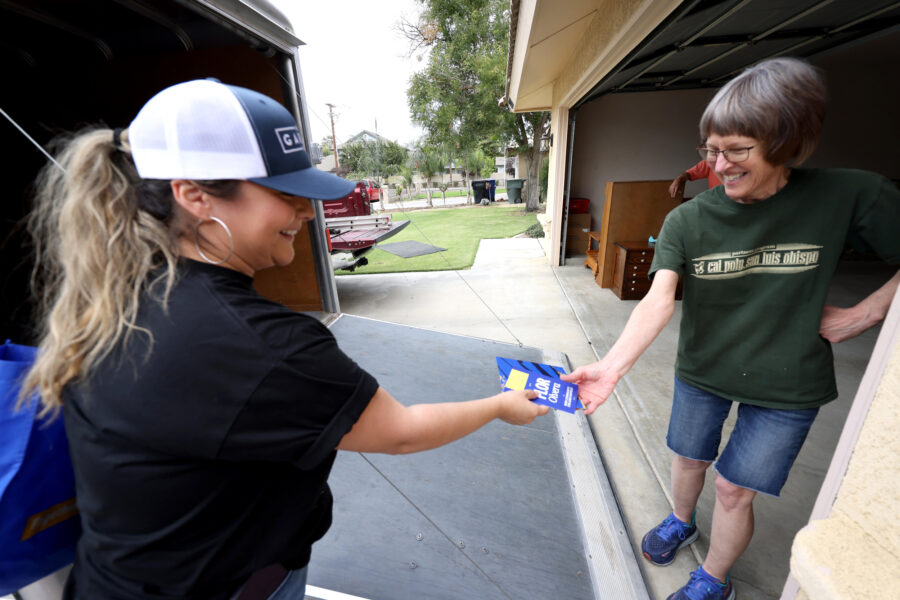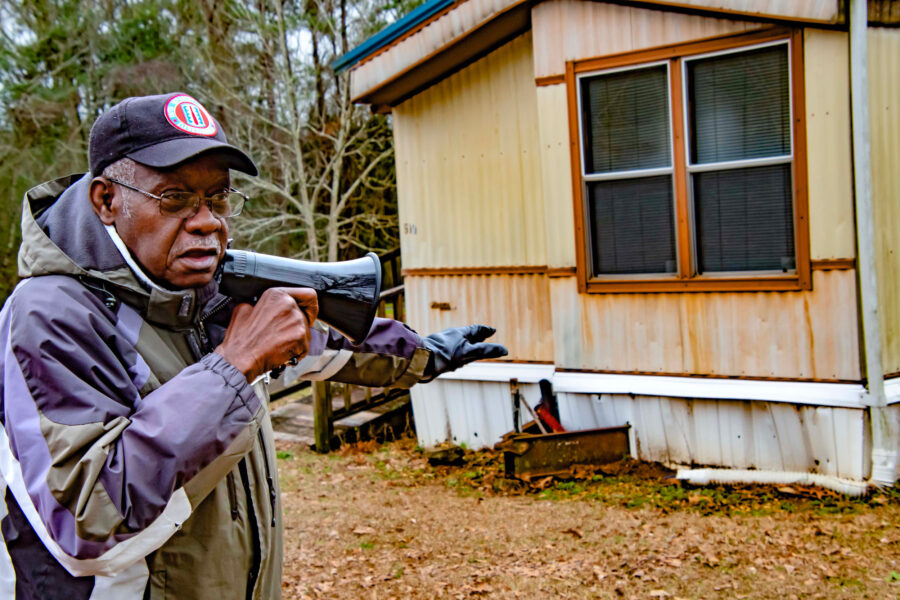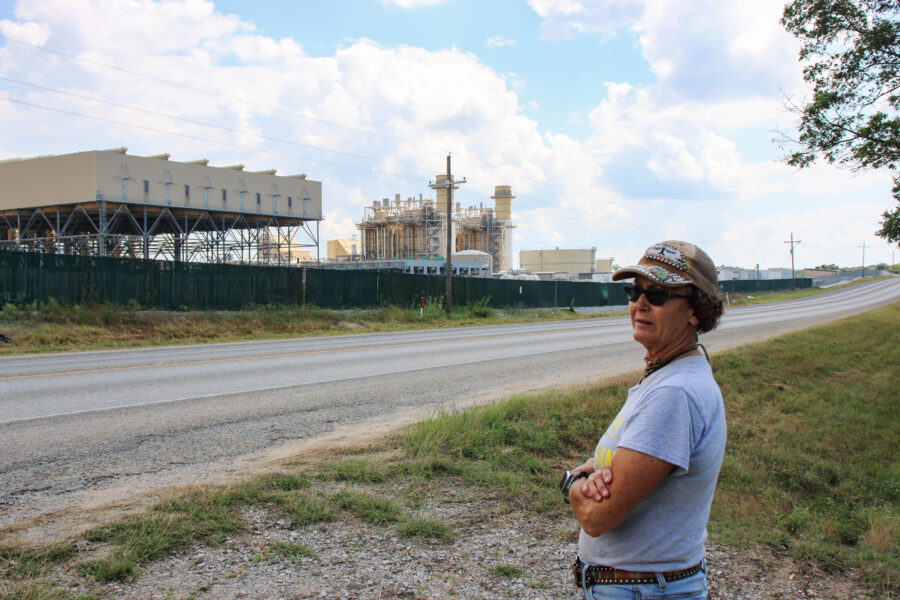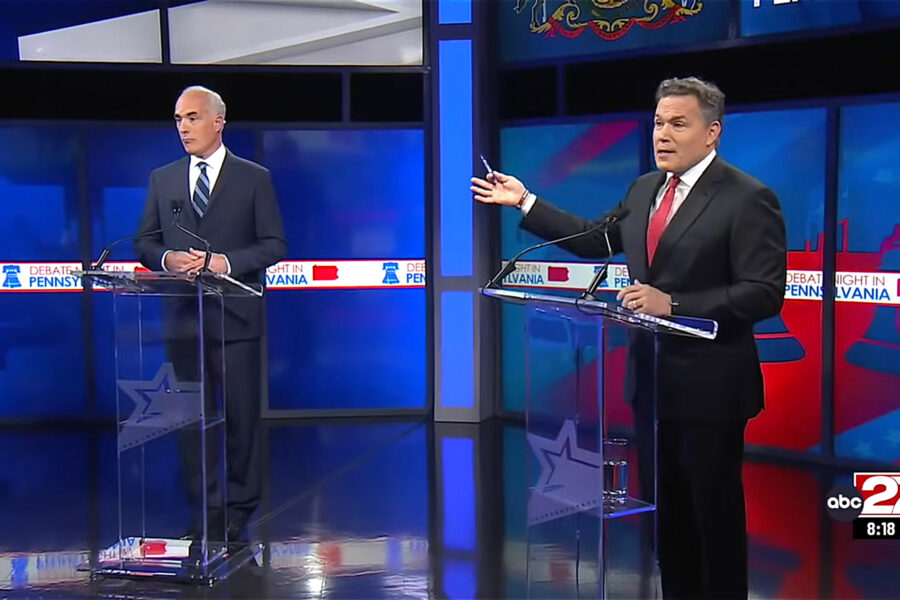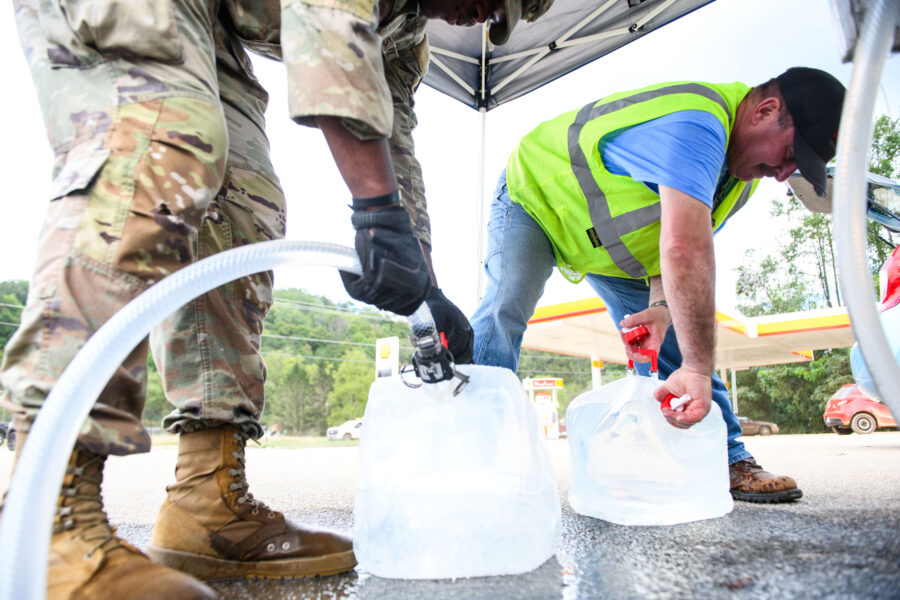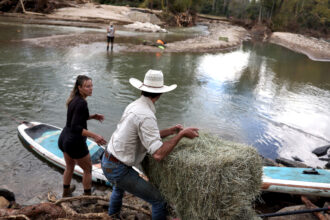Why Hurricane Helene Could Finally Change the Conversation Around Climate Change
From our collaborating partner Living on Earth, public radio’s environmental news magazine, an interview by host Steve Curwood with Abrahm Lustgarten, author of “On the Move: The Overheating Earth and the Uprooting of America.”
It may be weeks, months or even years before we fully understand the catastrophic impact of Hurricane Helene.
While still over water, Helene first flattened many shoreside communities along the Gulf Coast of Florida before it ripped ashore in North Florida and rampaged through five more states, leaving many in its path without working roads, power, food, and water.
Helene’s huge size and speed are linked to increasingly hotter water in the Gulf of Mexico, and a stark reminder that with global heating, weather forecasts based on history are becoming poorer guides to present dangers. Hurricanes have usually weakened when they make landfall, but to the surprise of many, Helene’s impact was just as devastating in the inland mountains of western North Carolina as on the Gulf Coast of Florida.
Explore the latest news about what’s at stake for the climate during this election season.
Gargantuan amounts of moisture drenched hills and valleys of the region with water that had nowhere to go but down into homes, businesses, roads and bridges along the swollen rivers and streams. The death toll is nearing 200, with many others still missing, and the final numbers could be much higher.
Abrahm Lustgarten is a journalist and author of On the Move: The Overheating Earth and the Uprooting of America. This interview has been edited for length and clarity.
STEVE CURWOOD: What role does climate denialism play in the wake of disasters like Hurricane Helene? To what extent can communities continue to turn a blind eye here?
ABRAHM LUSTGARTEN: This is a difficult question for me to answer. Politically, climate denialism will make it difficult for certain people in certain places to have a forthright conversation about what has just happened to their towns, to their homes, to their cities, and that’s going to make a policy response or a decision about what kind of government response people expect difficult to arrive at.

On the other hand, my experience socially in talking to a lot of people through the course of my reporting is that there is an undeniable sense and a real consensus among all types of different political views that the environment around them is rapidly changing, and that is changing in disruptive ways. And I hear this in all sorts of ways.
I hear from conservative homeowners on the coast of Florida that they were just surprised to see a flood coming again year after year, that they remember hurricanes from years past. And hurricanes are a normal part of living on the Gulf Coast, but they don’t remember them being so destructive and so frequent. That might not be a person who is politically supportive of the idea of climate change, but that is an acknowledgement of what we all see happening around us, which is that the present doesn’t feel like it’s matching the patterns of the past, and that environmental change is something that people are concerned about. There’s a certain consensus—and Helene and the records that it is shattering will contribute to a hardening of that consensus—that we live in a new era.
CURWOOD: We don’t really know in dollar terms what the economic impact of Helene will prove to be. Those measurements will be taken in the years ahead. But the insurance risk is $150 billion; a lot of people lost their jobs, lost their livelihoods, are out of work, are seeing the ability to sell their homes really decline. To what extent is the climate emergency a threat to our entire economy?
LUSTGARTEN: It’s a huge threat to our entire economy.
The research alone has already predicted long before this storm that climate pressures will create a drag on the national economy: 1.2 percent of GDP annually per one degree Celsius of warming is the estimate that’s in published, peer-reviewed papers.
Those estimates increase dramatically for the most vulnerable parts of the country, so parts of the Gulf Coast Florida—the counties that are closest to hurricane risk, for example—they’re projected to see economic drags of up to 60 percent of their local GDP. There’s already a baked-in assumption that the effects of climate change are going to make it harder and harder to have a vibrant and thriving economy.
Part of what we’re seeing when we talk about the costs of a disaster like Helene is, what does it cost to rebuild and to make those people who were directly affected whole? What does it cost the federal government? What does it cost the National Flood Insurance Program? What do we choose to invest in it, in terms of not only aid to help people recover, but all of the infrastructure investments and policy changes that come afterwards?
It will be very expensive to try to build back these communities and to try to make them more sustainable and stronger in the future. And then what happens if and when we see another disaster that overlaps with this one, which is increasingly likely with climate change, so that basically, the costs of this one are not fully repaid before we have to start to pay the similar costs of the next one?
That’s the kind of snowballing effect that can start to seem really scary to the economists that I talk to.
CURWOOD: What about the social and emotional costs here? I know you’re not a psychologist, you’re not a social psychologist, but you talked to many people in preparing your book about the uprooting of America. What do you hear are the social and emotional costs of disasters like this?
LUSTGARTEN: First of all, my heart goes out to people who are impacted by this storm. The kind of destruction that we’ve all been looking at in newsreels is absolutely heartbreaking. Talking to people who are affected in that way, obviously every person is different, and there’s a spectrum of reactions.
Some people will be immediately dislodged from their lives by an experience like this, and they will move or make dramatic changes. Many other people will be resilient to a degree, and this is probably much more common. In the course of my reporting on migration, it takes many, many small impacts or incidents like this to add up to a decision to move or to migrate.
If you look at a storm like Helene in that context, then I would think we have a gradation of its psychological impacts on people. There are people on the Gulf Coast, who are in parts of Florida for whom this is the fifth disaster or the 10th disaster that they lived through. Some of them I’ve seen interviewed had just finished putting up the sheetrock on the repairs from what happened last year. Those people are very vulnerable and closer on the spectrum to giving in to that relentless drumbeat of bad news and risk than somebody in Asheville, North Carolina, for whom this storm was a surprise, for whom maybe they hadn’t experienced an event like this before.
I’m sure that it shakes everybody to their core. But on the spectrum of what makes somebody actually move, there’s a gradation depending on how many times this has happened to you.
CURWOOD: We have storms now that are traveling much farther inland than we expected. They’re wetter, slower, more destructive. From your perspective and what people have told you, what’s to be done?
LUSTGARTEN: We are in an era where we have to anticipate the unexpected and we have to understand the limits of what we can know. If you want to translate that uncertainty to hard plans, those plans might look like living and developing a community around a worst-case scenario instead of a fingers-crossed scenario.
I don’t know the community of Asheville very well, but I imagine that that might mean developing beyond the furthest reaches of the floodplain for the worst-case scenario, or imagining that every storm could potentially have the kind of unexpected impacts that we saw in this storm. And that’s really a reversal from how we’ve lived in the past, where we trust the data of history to inform the data of the future.
What it means to be in an era of discontinuity is that you can’t trust that data anymore, and so you have to guess about how bad it could be. And if we can wrap our minds around a guess, a physical planning paradigm that imagines the worst case, then we can keep ourselves kind of beyond the boundaries of that worst case, at least a little bit more reliably.
CURWOOD: Preparing for that worst case costs a lot of money—and people think that is a waste of money.
LUSTGARTEN: I talk about this a lot, and it’s one of the more depressing elements of the climate adaptation story for the United States: The costs of adapting to climate change are going to prove so unfathomably expensive that I don’t think we collectively, or our governments, can really wrap their minds around that yet.
The flip side of what that investment will require is what I believe is the reality, the truth, that certain places will never be able to afford that adaptation. This may be a very long way into the future, and it depends on the frequency of disasters, but there will become places that are unprotectable, where we cannot afford to rebuild, where we cannot afford to build in the way that is truly resilient, because it is too expensive. We’re more likely as a society to spend that money and make those investments in the larger urban places where there’s a collectivization of the services and community support for the population that lives there.
We’re trending into the science-fiction realm here—or at least my imagining of the future—but when I try to imagine what a community that is failing on the far end of this transition looks like, the researchers that I talk to tell me to expect the disappearance of publicly provided services like garbage pickup, 911 service and emergency services, and the availability of insurance and those basic community fundamentals first. That might follow the decrease of a tax base that dwindles as the population shrinks, which also precipitates a drop in the quality of schools and a drop in the quality of infrastructure.
All of these things start to self perpetuate and spiral downwards, and then once you lose that consistency of services and economic stability, I think of it as communities kind of de-evolving back into what we would call a rural state, where eventually you have people who have to be self-sufficient and self-dependent in order to live there.
CURWOOD: What are the odds that Helene might just prove to be a tipping point for awareness of the growing risk from climate disruption in this country, and that there’ll be broader acceptance in taking steps to both reduce our emissions and also to adapt to the effects of the emissions that have already been made?
LUSTGARTEN: I think there’s a good chance that Helene alters the conversation. It depends in part on how that conversation is framed in the coming days and weeks, and whether we discuss what’s happened in the context of climate change, and whether the attribution science comes out and says that Helene was significantly influenced by climate change. All of those things will steer this conversation, but there’s no doubt that the frustration and danger and horror experienced by so many people, particularly on the Gulf Coast, is reaching a saturation point of sorts that I would expect to change the conversation around climate change.
There’s no doubt that in places like Asheville, North Carolina, the level of surprise—of sort of dumbfoundedness—that something like this could happen from a hurricane that came off the coast, and that it could dump so much water so quickly, is a different but similar kind of awakening.
Absolutely, there will be fresh conversations in those parts of the country about whether this was climate-caused, and what that means. If you’re trying to imagine this happening repeatedly, what that means for your life and your future, those are the seeds for what will translate, one would hope, to offering political support for climate action, or supporting changes in lifestyle and behavior and consumption that lead to lowering emissions. I think that’s really what we’re talking about when we talk about, do people see this as a turning point in their acknowledgement of climate change? Are they willing to do something about it?
About This Story
Perhaps you noticed: This story, like all the news we publish, is free to read. That’s because Inside Climate News is a 501c3 nonprofit organization. We do not charge a subscription fee, lock our news behind a paywall, or clutter our website with ads. We make our news on climate and the environment freely available to you and anyone who wants it.
That’s not all. We also share our news for free with scores of other media organizations around the country. Many of them can’t afford to do environmental journalism of their own. We’ve built bureaus from coast to coast to report local stories, collaborate with local newsrooms and co-publish articles so that this vital work is shared as widely as possible.
Two of us launched ICN in 2007. Six years later we earned a Pulitzer Prize for National Reporting, and now we run the oldest and largest dedicated climate newsroom in the nation. We tell the story in all its complexity. We hold polluters accountable. We expose environmental injustice. We debunk misinformation. We scrutinize solutions and inspire action.
Donations from readers like you fund every aspect of what we do. If you don’t already, will you support our ongoing work, our reporting on the biggest crisis facing our planet, and help us reach even more readers in more places?
Please take a moment to make a tax-deductible donation. Every one of them makes a difference.
Thank you,
David Sassoon
Founder and Publisher
Vernon Loeb
Executive Editor
Share this article
- Republish
Disclaimer: The copyright of this article belongs to the original author. Reposting this article is solely for the purpose of information dissemination and does not constitute any investment advice. If there is any infringement, please contact us immediately. We will make corrections or deletions as necessary. Thank you.

